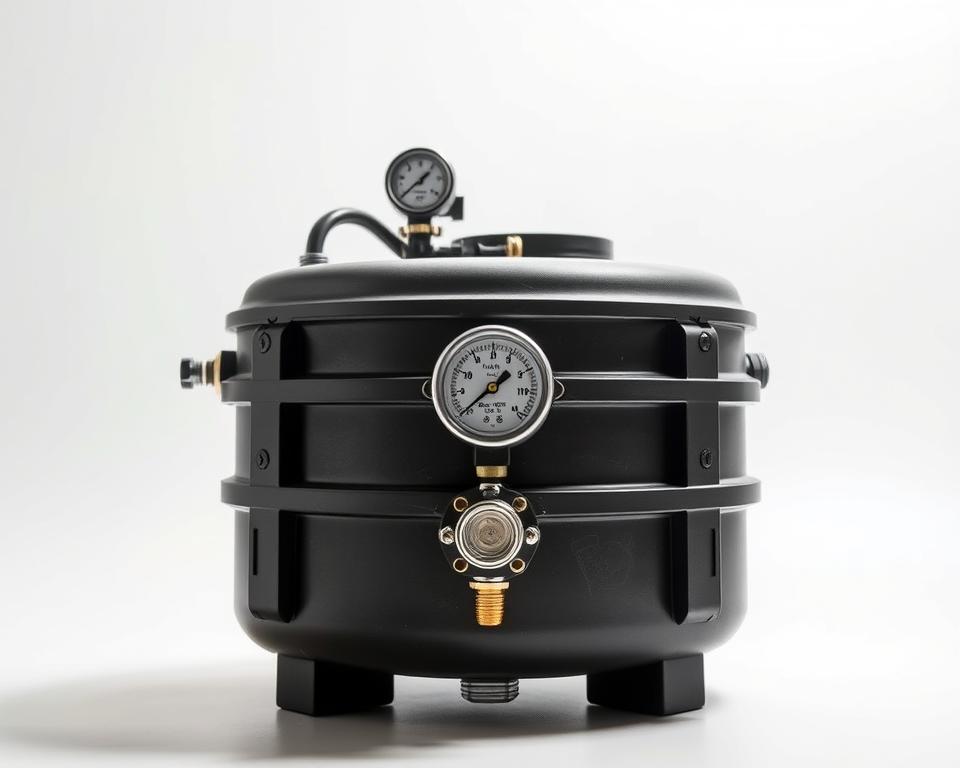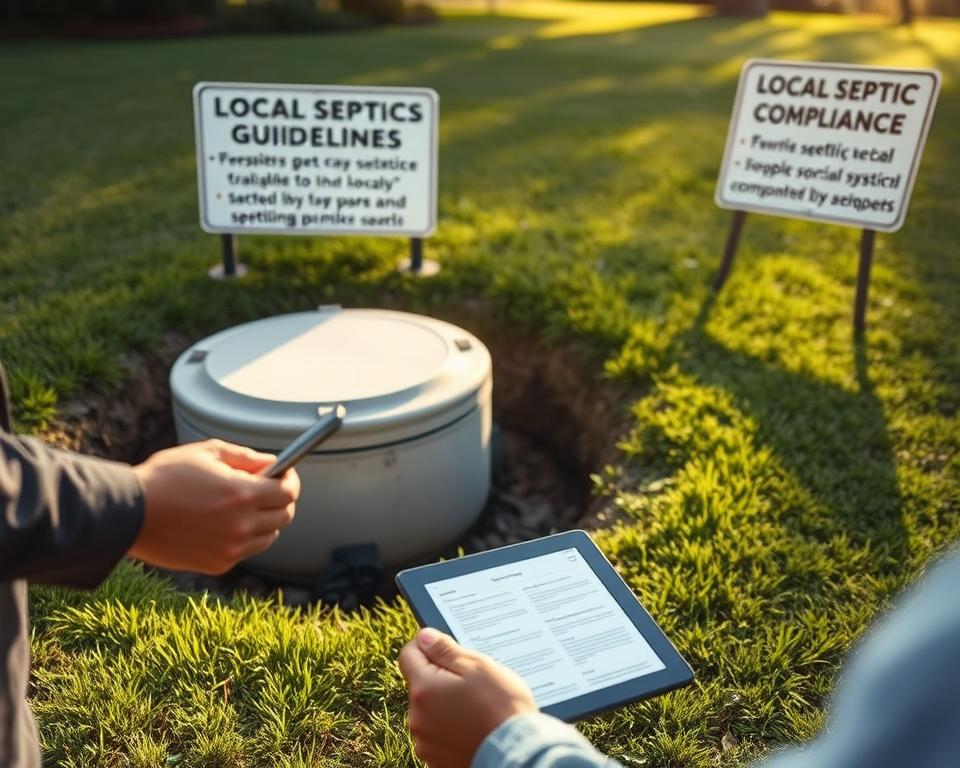Essential Care Tips for Your RV Septic Tank Service
Curious about what takes place to your RV’s Septic tank while you’re traveling? It’s more than avoiding bad smells. Caring for your RV Septic tank well-maintained helps secure hassle-free trips. A well-maintained system halts messy incidents and costly expenses. However, many ignore this critical care. In this guide, we unpack the need for regular RV septic tank pumping cost. We’ll spotlight maintenance importance and share tips for maintaining your recreational vehicle’s Septic tank. Gear up for worry-free trips!
Notable Observations
- Scheduled RV Septic tank service is vital for top performance.
- Understanding your RV Septic system assists avoid costly repairs.
- Preventive maintenance wards off unpleasant odors and clogs.
- Establish a pumping schedule based on your usage.
- Practice best practices for emptying your holding tanks.
- Steer clear of common mistakes to extend the life of your Septic system.
- Know when to enlist professional help for Septic services.
Understanding RV Septic Systems
An RV Septic system is crucial for any camper. It includes multiple holding tanks that handle waste efficiently. You’ll find three main tanks in an RV: the fresh water, the gray, and the black tank. The fresh water tank delivers clean water for drinking and cooking. Meanwhile, the gray tank collects wastewater from sinks and showers, promoting cleanliness. The black tank, specifically for toilet waste, also has a vent to reduce odors.
Maintaining a healthy camper sewage system calls for recognizing how these parts work together. Frequent checks of the tank levels are essential to stop overflow and ensure everything runs smoothly. Getting to know the termination valves is crucial too. These valves are key in properly directing waste disposal. By familiarizing yourself with these components, you can keep your RV in prime form and savor your travels without unwanted hassles.
| Reservoir | Purpose | Volume |
|---|---|---|
| Fresh Water Tank | Supplies drinking and cooking water | 30-100 gallons |
| Gray Tank | Stores wastewater from sinks and showers | 30-60 gallons |
| Black Tank | Stores toilet waste | 30-50 gallons |
Benefits of Regular RV Septic Tank Service
Consistent RV Septic tank service is central to maintaining your system efficient and long-lasting. Without proper maintenance, you could face system failures, bad smells, and costly repairs—issues that disrupt your adventures.
Neglecting the upkeep of your RV’s Septic system may cause it to back up. This not only slows your RV’s function but also your comfort levels. A clean and regularly cleaned system is necessary for hassle-free trips, granting you a peaceful travel experience.

Regular maintenance extends your sewage system’s lifespan and preserves a clean living space. Watching your Septic tank allows you catch issues early. This pre-planning cuts costs and stress, giving you confidence during your journeys.
How Often to Pump Your RV Septic Tank
Figuring out the right schedule for RV Septic tank maintenance hinges on the vehicle’s usage. For those continuously on the road or living in their RVs, it’s recommended to drain the black tank every three to five days. This practice keeps cleanliness and avoids unexpected issues during voyages.
Weekend adventurers can usually wait until they return home to pump their Septic tank. Keeping waste in the tank too long, though, can cause build-up that hinders the tank’s function and smell control. It’s vital to monitor the tank’s level closely, get ready for disposal once it hits ≈66% full to keep everything running smoothly.
The capacity of your Septic system, along with how you use your RV, will dictate when to pump. Understanding these aspects improves your RV’s performance and minimizes the dangers of poor waste management.
| Usage Pattern | Ideal Pumping Cadence | Signs for Immediate Pumping |
|---|---|---|
| Frequent Usage | Every 3-5 days | Tank is two-thirds full |
| Weekend Trips | After return home | Noticeable stench or slow drainage |
| Extended Trips | Every 2-3 days | Gauge shows near full |
How to Empty RV Holding Tanks Properly
Effectively managing a recreational vehicle’s holding tanks is essential for a pleasant camping experience. Begin by draining the black tank first. This strategy enables the gray water to flow through and help rinse out the hose. Ensure the use of a high-quality sewer hose for a tight connection and to cut spills. Once the tanks are emptied, completely flushing the black tank is crucial. Using a built-in black tank flush or comparable alternatives can dramatically cut residue.
After the emptying process, it’s essential to close both valves tightly. This action is important to maintain a fully operational Septic system. Additionally, RV owners must rely on dump stations properly and adhere to local laws. Regular cleaning practices for recreational vehicle Septic tanks are necessary. They protect the system’s optimal functionality and avert future odors.
How to Stop RV Odors & Clogs
To control odors and stop clogs in your RV, being meticulous is key. The task begins with ensuring enough water in the holding tanks. Adequate water assists in breaking down waste properly, lowering bad smells.
Selecting suitable toilet paper is critical in this process. Opt for RV-safe toilet paper that disintegrates quickly, stopping clogs. This minor adjustment greatly helps with maintaining seamless waste flow.
Applying enzyme-based treatments can further boost waste decomposition and odor control. These bio solutions assist keep your RV smelling fresh. It’s also important to regularly inspect vent pipes for obstructions to guarantee good airflow and prevent odors from infiltrating your living area.
RV Septic Maintenance: Mistakes to Avoid
Looking after your RV’s Septic system properly is vital for its effectiveness and longevity. When non-biodegradable items like wipes or feminine products are flushed, they can cause major blockages. These blockages can lead to various problems that are difficult to resolve.
Not using enough water when flushing can also damage the system. It causes waste buildup, resulting in foul smells and potential damage. Furthermore, a common mistake at full hook-up sites is leaving the black tank valve open. This lets waste to collect at the tank’s bottom.
Preventive measures involve routinely flushing and rinsing tanks after emptying them. Ignoring maintenance can grow into significant issues necessitating pricey repairs. Being prepared and knowledgeable helps both your RV and your finances.
Signs You Need Professional RV Septic Help
Understanding when to seek professional RV Septic services is essential for maintaining a healthy Septic system. Some signs point to the need for expert intervention. Should you spot slow-draining tanks or experience persistent foul odors emanating from your RV, it is prudent to act promptly. These signs often mean underlying issues that require a thorough Septic tank service for resolution.
Visible leftover waste after emptying can also indicate problems within your Septic system. This situation may not fix with routine maintenance and may call for the use of specialized equipment. Professionals are ready to tackle complex challenges using tools, such as high-pressure water jets, to ensure a comprehensive cleaning process.
Early professional assistance can make a major difference. Minor troubles can quickly escalate into more severe complications without proper care. Investing in professional RV Septic services protects the integrity of your system and lengthens its lifespan.
| Problem Indicators | Recommended Action |
|---|---|
| Slow draining tanks | Contact professional RV Septic services for assessment |
| Persistent foul odors | Schedule Septic tank service for diagnostics |
| Visible leftover waste | Seek immediate assistance from a professional |
| Frequent clogs | Consider expert cleaning solutions |
Ensuring Long-Term RV Septic Health
Long-term care for RV Septic systems calls for attention past basic pump-outs. Performing deep cleaning of tanks every few months prevents buildup and prolongs system life. Examining dump valve seals on schedule avoids leaks. Additionally, sanitizing the system keeps it clean and functioning well.
It’s vital to monitor tank sensors to ensure they work correctly. Incorrect readings may result in over-filling, hurting performance. Periodic sensor checks and tweaking maintenance schedules can ward off this problem.
| Maintenance Task | Frequency | Why It Helps |
|---|---|---|
| Deep Cleaning Tanks | Every 3-6 months | Keeps flow smooth |
| Inspect Dump Valve Seals | Monthly | Prevents drips |
| Sanitize System | Every 6 months | Controls bacteria |
| Monitor Tank Sensors | Monthly | Guards against overflow |
Forward-thinking maintenance is central to your RV Septic system’s long-term health. It lays the groundwork for smooth and seamless travel experiences.
Why Choose All In Sanitation for RV Septic Needs
All In Sanitation excels at providing RV Septic services that match each client’s specific needs. Whether it’s scheduled pump-outs or comprehensive tank cleaning, they grasp the vital role of a well-functioning Septic system in your RV’s performance.
Thanks to extensive expertise in RV Septic systems, All In Sanitation provides top-tier guidance on maintenance and care. Their team is experienced in the unique challenges RV owners meet and provides effective solutions when troubles arise.
Selecting All In Sanitation lets RV enthusiasts fully engage in their journeys, entrusting Septic concerns to a dependable ally. Their dedication to excellent service provides peace of mind and boosts the pleasure of adventures on the open road.
In Closing
Maintaining your RV Septic tank is critical for seamless travels. It’s important to know your system and keep up with regular services. This ensures you won’t face unexpected issues on your journey. These key steps include frequent pumping and adopting sound waste management practices.
Proper long-term care keeps your system in prime form. By implementing the provided maintenance tips, you can boost your travel experience. This strategy guards against expensive repairs later. Remember, avoiding common errors and knowing when to get professional help are vital.
In the end, being prepared in your RV Septic system’s maintenance secures a hassle-free adventure. It lets you to concentrate on forming lasting memories. So, take these steps to heart and savor your road trips to their fullest.


